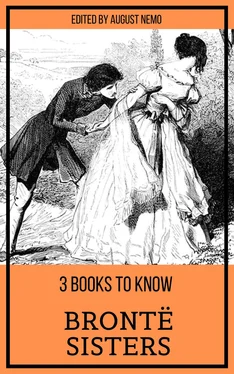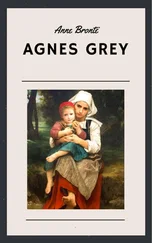‘Now,’ thought I, ‘if I had but a pencil and a morsel of paper, I could make a lovelier sketch than hers, admitting I had the power to delineate faithfully what is before me.’
But, though this satisfaction was denied me, I was very well content to sit beside her there, and say nothing.
‘Are you there still, Mr. Markham?’ said she at length, looking round upon me—for I was seated a little behind on a mossy projection of the cliff.—‘Why don’t you go and amuse yourself with your friends?’
‘Because I am tired of them, like you; and I shall have enough of them to-morrow—or at any time hence; but you I may not have the pleasure of seeing again for I know not how long.’
‘What was Arthur doing when you came away?’
‘He was with Miss Millward, where you left him—all right, but hoping mamma would not be long away. You didn’t intrust him to me, by-the-by,’ I grumbled, ‘though I had the honour of a much longer acquaintance; but Miss Millward has the art of conciliating and amusing children,’ I carelessly added, ‘if she is good for nothing else.’
‘Miss Millward has many estimable qualities, which such as you cannot be expected to perceive or appreciate. Will you tell Arthur that I shall come in a few minutes?’
‘If that be the case, I will wait, with your permission, till those few minutes are past; and then I can assist you to descend this difficult path.’
‘Thank you—I always manage best, on such occasions, without assistance.’
‘But, at least, I can carry your stool and sketch-book.’
She did not deny me this favour; but I was rather offended at her evident desire to be rid of me, and was beginning to repent of my pertinacity, when she somewhat appeased me by consulting my taste and judgment about some doubtful matter in her drawing. My opinion, happily, met her approbation, and the improvement I suggested was adopted without hesitation.
‘I have often wished in vain,’ said she, ‘for another’s judgment to appeal to when I could scarcely trust the direction of my own eye and head, they having been so long occupied with the contemplation of a single object as to become almost incapable of forming a proper idea respecting it.’
‘That,’ replied I, ‘is only one of many evils to which a solitary life exposes us.’
‘True,’ said she; and again we relapsed into silence.
About two minutes after, however, she declared her sketch completed, and closed the book.
On returning to the scene of our repast we found all the company had deserted it, with the exception of three—Mary Millward, Richard Wilson, and Arthur Graham. The younger gentleman lay fast asleep with his head pillowed on the lady’s lap; the other was seated beside her with a pocket edition of some classic author in his hand. He never went anywhere without such a companion wherewith to improve his leisure moments: all time seemed lost that was not devoted to study, or exacted, by his physical nature, for the bare support of life. Even now he could not abandon himself to the enjoyment of that pure air and balmy sunshine—that splendid prospect, and those soothing sounds, the music of the waves and of the soft wind in the sheltering trees above him—not even with a lady by his side (though not a very charming one, I will allow)—he must pull out his book, and make the most of his time while digesting his temperate meal, and reposing his weary limbs, unused to so much exercise.
Perhaps, however, he spared a moment to exchange a word or a glance with his companion now and then—at any rate, she did not appear at all resentful of his conduct; for her homely features wore an expression of unusual cheerfulness and serenity, and she was studying his pale, thoughtful face with great complacency when we arrived.
The journey homeward was by no means so agreeable to me as the former part of the day: for now Mrs. Graham was in the carriage, and Eliza Millward was the companion of my walk. She had observed my preference for the young widow, and evidently felt herself neglected. She did not manifest her chagrin by keen reproaches, bitter sarcasms, or pouting sullen silence—any or all of these I could easily have endured, or lightly laughed away; but she showed it by a kind of gentle melancholy, a mild, reproachful sadness that cut me to the heart. I tried to cheer her up, and apparently succeeded in some degree, before the walk was over; but in the very act my conscience reproved me, knowing, as I did, that, sooner or later, the tie must be broken, and this was only nourishing false hopes and putting off the evil day.
When the pony-carriage had approached as near Wildfell Hall as the road would permit—unless, indeed, it proceeded up the long rough lane, which Mrs. Graham would not allow—the young widow and her son alighted, relinquishing the driver’s seat to Rose; and I persuaded Eliza to take the latter’s place. Having put her comfortably in, bid her take care of the evening air, and wished her a kind good-night, I felt considerably relieved, and hastened to offer my services to Mrs. Graham to carry her apparatus up the fields, but she had already hung her camp-stool on her arm and taken her sketch-book in her hand, and insisted upon bidding me adieu then and there, with the rest of the company. But this time she declined my proffered aid in so kind and friendly a manner that I almost forgave her.
––––––––
SIX WEEKS HAD PASSED away. It was a splendid morning about the close of June. Most of the hay was cut, but the last week had been very unfavourable; and now that fine weather was come at last, being determined to make the most of it, I had gathered all hands together into the hay-field, and was working away myself, in the midst of them, in my shirt-sleeves, with a light, shady straw hat on my head, catching up armfuls of moist, reeking grass, and shaking it out to the four winds of heaven, at the head of a goodly file of servants and hirelings—intending so to labour, from morning till night, with as much zeal and assiduity as I could look for from any of them, as well to prosper the work by my own exertion as to animate the workers by my example—when lo! my resolutions were overthrown in a moment, by the simple fact of my brother’s running up to me and putting into my hand a small parcel, just arrived from London, which I had been for some time expecting. I tore off the cover, and disclosed an elegant and portable edition of ‘Marmion.’
‘I guess I know who that’s for,’ said Fergus, who stood looking on while I complacently examined the volume. ‘That’s for Miss Eliza, now.’
He pronounced this with a tone and look so prodigiously knowing, that I was glad to contradict him.
‘You’re wrong, my lad,’ said I; and, taking up my coat, I deposited the book in one of its pockets, and then put it on (i.e. the coat). ‘Now come here, you idle dog, and make yourself useful for once,’ I continued. ‘Pull off your coat, and take my place in the field till I come back.’
‘Till you come back?—and where are you going, pray? ‘No matter where—the when is all that concerns you;—and I shall be back by dinner, at least.’
‘Oh—oh! and I’m to labour away till then, am I?—and to keep all these fellows hard at it besides? Well, well! I’ll submit—for once in a way.—Come, my lads, you must look sharp: I’m come to help you now:—and woe be to that man, or woman either, that pauses for a moment amongst you—whether to stare about him, to scratch his head, or blow his nose—no pretext will serve—nothing but work, work, work in the sweat of your face,’ &c., &c.
Leaving him thus haranguing the people, more to their amusement than edification, I returned to the house, and, having made some alteration in my toilet, hastened away to Wildfell Hall, with the book in my pocket; for it was destined for the shelves of Mrs. Graham.
Читать дальше











